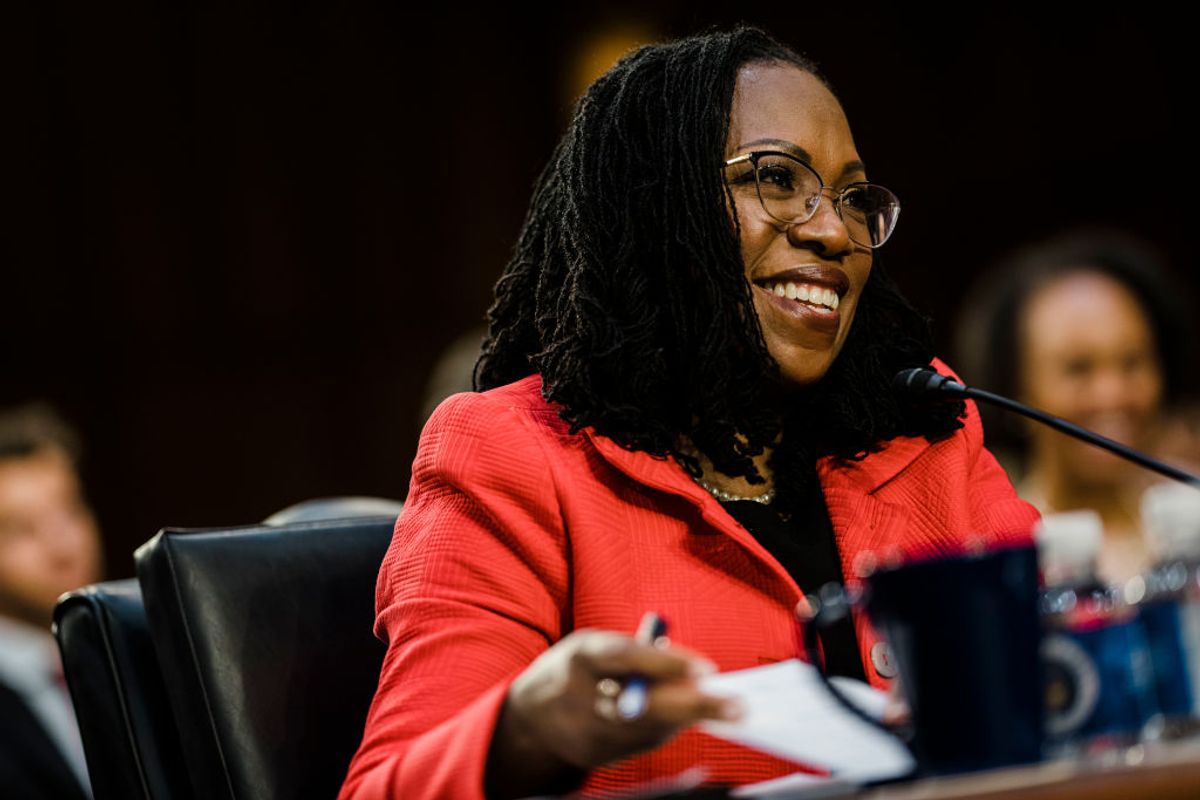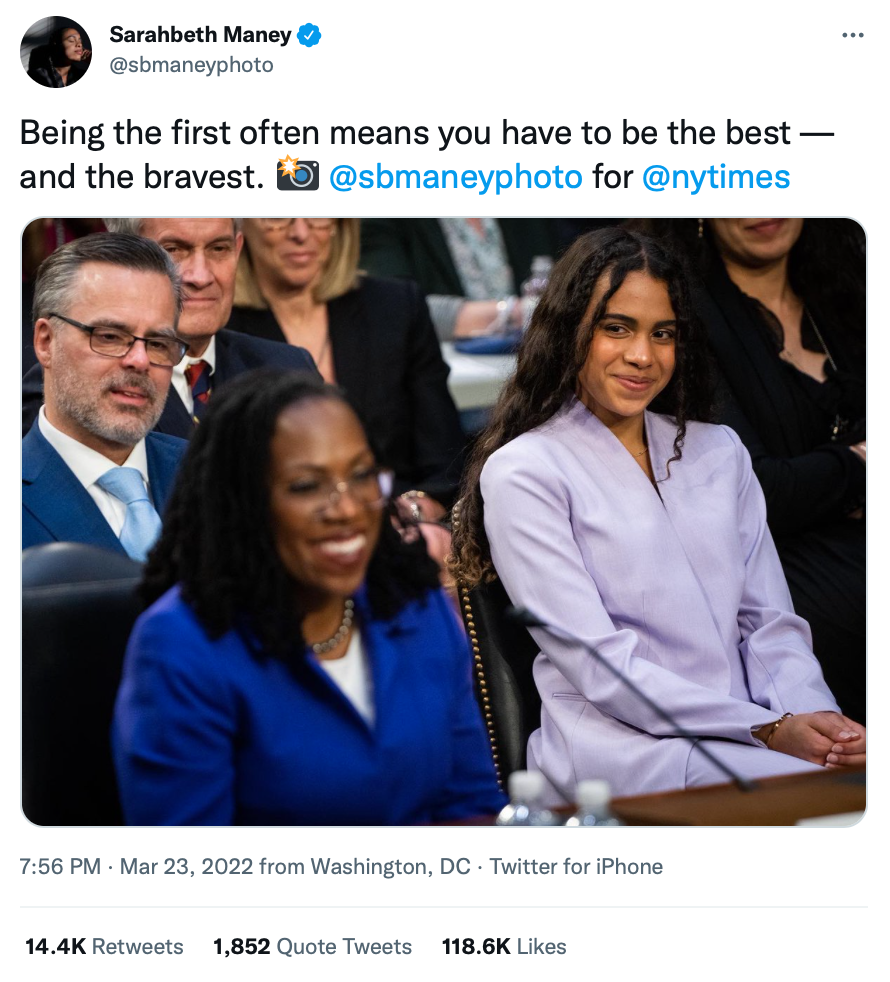After Republican U.S. Sen. Susan Collins, a centrist from Maine, said in late March 2020 that she plans to support Judge Ketanji Brown Jackson's nomination to the U.S. Supreme Court, the country was closer than ever to witnessing the confirmation of its first Black female justice.
Republican support was not necessary for Jackson's confirmation — Democratic Vice President Kamala Harris breaks any tie votes in the evenly split Senate — though Democrats have wanted "to claim some degree of bipartisanship around the historic nomination," The New York Times described.
The senator's announcement came after more than 30 hours of hearings the previous week during which her colleagues in the Senate Judiciary Committee interrogated Jackson about her sentencing history, personal beliefs, and social issues. Below are four key takeaways from those hearings, which will likely dictate the tone of senators' conversations ahead of their final confirmation vote.
The committee is set to recommend Jackson's nomination on April 4, and then the full floor vote will occur April 7 or April 8, as reported by The Washington Post, or later in April.
1. History Was Made.
Pending her confirmation, Jackson, 51, would be the first Black woman to serve on the court that once upheld racial segregation and has mostly operated with white men calling the shots.
That fact permeated her nomination hearings, particularly on the third day when Cory Booker, a Black Democrat from New Jersey, expressed frustration with his colleagues' line of questioning and brought Jackson to tears. “You have earned this spot," he said. "I know what it’s taken for you to sit here in this seat."
Meanwhile, some of our era’s leading civil rights figures and members of the Congressional Black Caucus packed the hearing room to support her, as The Associated Press (AP) reported.
2. High Drama Often Accompanies Such Nomination Hearings — But Not Really This Time.
Think about hearings to interrogate other nominees in the recent past, and you will quickly recall the sexual assault allegations that haunted Justice Brett Kavanaugh's appointment, or critics of Amy Coney Barrett, a conservative Catholic, who were upset that she replaced a liberal icon, Ruth Bader Ginsburg.
Go back even further in time to remember Ronald Reagan's nominee, Robert Bork, who Sen. Edward Kennedy described within hours of his nomination announcement as someone who wanted to force women into "back-alley abortions" and Black Americans to "sit at segregated lunch counters." Bork was defeated by a vote of 58 to 42, angering many Republicans, and his name became a symbol of conservative grievance, as explained by NPR.
Comparatively, the hearings for Jackson were less contentious. In part, that was because:
- Jackson's confirmation would not change the court's conservative-liberal split. She would replace liberal Justice Stephen Breyer, who is retiring after more than 27 years on the court. On the contrary, Barrett, who was appointed by Republican President Donald Trump to replace Ginsburg after her death in September 2020, moved the conservative-leaning court even further to the right.
- Jackson is well-liked, at least according to recent surveys. According to a March 2022 poll from Gallup, for instance, 58% of respondants said the Senate should confirm her appointment, compared to 30% who thought the opposite and 12% who said they didn't have opinion. Another poll by Politico found 47% of respondents want the Senate to vote "yes" on her nomination. Also, the American Bar Association's independent committee that evaluates Supreme Court nominees gave Jackson the same high rating that it had awarded most recent nominees, including Barrett, the AP reported.
- She appeared to strategically avoid articulating her views on hot topics, such as abortion, "court-packing" (or adding seats to the nine-member court) or cameras in courtrooms. Political analysts, such as NPR's senior political editor and correspondent, Domenico Montanaro, said that intentional side-stepping is a common tactic for Supreme Court nominees who want to avoid political controversy prior to their confirmation. "You don't want to offend the other side; don't give too much information out," he said on the NPR Politics Podcast.
3. GOP Midterm Signaling Was Strong.
With several high-profile Republicans on the committee that interrogated Jackson — including Lindsey Graham from South Carolina, Ted Cruz from Texas, Tom Cotton from Arkansas, and Josh Hawley from Missouri — the nomination hearings in some ways served as a platform for those party leaders to promote talking points that they arguably believe could help Republicans dominate the 2022 Midterm Elections. Those campaign hints touched on crime, critical race theory in schools, child pornography and gender definitions.
For instance, Hawley accused Jackson of issuing jail sentences for shorter lengths of time than federal guidelines or prosecutors' recommendations, specifically in child-porn cases (the AP fact-checked that allegation). As Montanaro put it, that back-and-forth was an attempt to label her as "soft on crime in an election year."
The attention on Jackson's rulings in child pornography cases — which she herself has said were among “the most difficult” of her career — may have also winked at members of a particular strain within the Republican Party with QAnon-adjacent beliefs.
Cruz also attempted to frame Jackson as someone who supported critical race theory, which has become code for how schools teach students about racism and prompted a recent wave of legislation at the state level to try to remove such lessons from classrooms. At one point, Cruz held up a book titled “Antiracist Baby” by scholar Ibram X. Kendi and asked, “Do you agree with this book that is being taught with kids that babies are racist?”
Jackson paused before responding to Cruz, stressing: "I have not reviewed any of those books, any of those ideas. They don't come up in my work as a judge, which I'm respectfully here to address."
4. Jackson is Virtually Assured the Seat, Pending Unforeseen Emergencies.
So long as enough Senate Democrats are "healthy and present" for the full floor vote, as The Washington Post put it, the position appears to be hers. "Jackson appears to be on a glide path to confirmation by mid-April," The Associated Press reported.
One lawmaker with a possible question mark was Sen. Joe Manchin — a Democrat who often agrees with Republicans in the 50-50 Senate — but he announced on March 25 that he supported Jackson's confirmation. In other words, Democrats were on track to confirm Jackson even before Collins said she would also vote in Jackson's favor.


